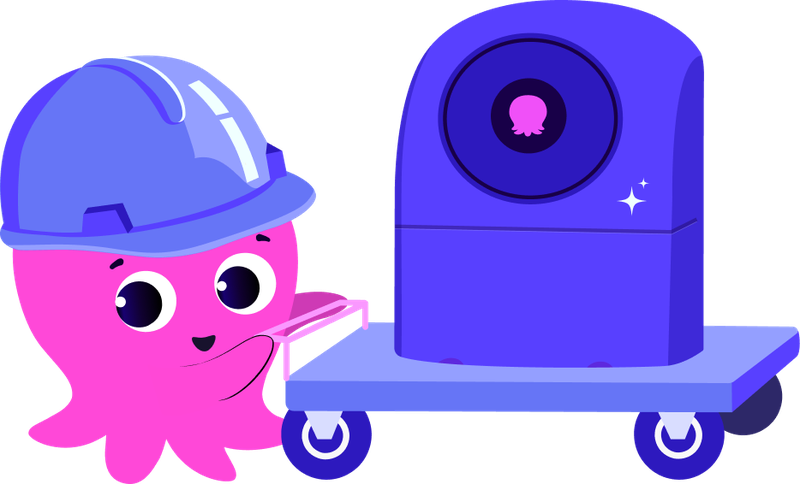Heat pump vs gas boiler | Which is better for your home in 2026?
Ah, the trusty gas boiler - once the hero of cosy nights and long, luxurious showers. Faithful, yes. Efficient? Not so much anymore. As it starts rattling, clanking, and whispering its morse-code cry for help, you might be wondering: should you repair your old gas boiler or switch to a heat pump?
Here’s the truth: modern air-source heat pumps are cleaner and far more energy-efficient than traditional boilers. They don’t burn fossil fuels, they lower your carbon footprint, and they can cut your heating costs with the right tariff.
Here's why you should ditch your boiler for a heat pump
Heat pumps vs gas boilers is a common debate, but newer ASHP (air source heat pump) models like our Cosy, make the difference even clearer. For those considering upgrades, you might ask, "can a heat pump replace a boiler or a combi boiler?" Here's why it's not just a replacement, but the way forward:
1. Heat pumps are the future (and the government thinks so too)
Under the Boiler Upgrade Scheme, the UK government is offering a generous £7,500 grant towards the cost of replacing a gas boiler with a heat pump for eligible homes. That’s a huge chunk of the upfront investment covered.
Did you know ❓
Octopus Energy is the largest heat pump installer under the Boiler Upgrade Scheme - this is based on our own benchmarking against Ofgem reports from 2024. And we've continued to grow ever since!
2. They don’t burn fuel, so they’re cleaner
Instead of burning gas (and coughing out carbon emissions), heat pumps cleverly pull heat from the air or ground and use electricity to move it indoors. By making the switch to an air source heat pump like Cosy from, you actively choose to lower your carbon footprint. That means you're helping us chip away at emissions and make the grid greener, bit by bit.
3. Running costs can be lower
Yes, gas is currently cheaper per unit than electricity, but heat pumps are 3 to 4 times more efficient. That means for every unit of electricity they use, they give you three to four units of heat back. Over time, that can mean serious savings compared to a new gas boiler, particularly if you’re savvy with off-peak electricity tariffs or pair it with solar panels. If you're curious about the numbers, head to our heat pump cost calculator to compare potential running costs vs. a gas boiler.
4. Comfort like you’ve never known before
Forget the days of blasting the radiators for half an hour, then running around the house to turn them off when it gets too hot. Heat pumps work best when they’re on steadily, keeping your home at a lovely even temperature. No more hot-cold-hot-cold nonsense. Just calm, consistent cosiness.

Ready to start your heat pump journey?
Answer a couple of simple questions about your home, and see if you’re eligible for the £7,500 heat pump grant.
Are heat pumps better than boilers?
When it comes to heating your home, not all systems are created equal. Gas boilers have been the standard for decades, but heat pumps are quickly becoming the smarter, cleaner, and more efficient choice.
The numbers don't lie
In this comparison, we’ll break down exactly why a heat pump outperforms a gas boiler in terms of efficiency, running costs, carbon emissions, and long-term value. If today's a great day for science, I invite you to nerd out with a direct link to our claims explained.
Heat pumps cut your carbon emissions by around 80%
Switching from a gas boiler to an electric heat pump can reduce your heating carbon emissions by roughly 83%. Here’s why:
- A typical gas-heated home produces around 2.42 tonnes of CO₂ per year.
- The same home heated with a heat pump produces only 0.40 tonnes of CO₂ per year.
- That’s a saving of over 2 tonnes of CO₂ every year - roughly the emissions of a small car driving 10,000 miles.
This is based on real-world performance of low-temperature heat pumps and typical UK gas boilers.
Heat pumps are up to 4x more efficient than gas boilers
Heat pumps don’t create heat, they move it from the air, ground, or water into your home. This means:
- For every 1 kWh of electricity, a heat pump can deliver 3.3 kWh of heat.
- Gas boilers, by comparison, are around 85% efficient, giving less than 1 kWh of heat per 1 kWh of gas.
In other words, heat pumps use energy much more efficiently, almost 4 times better than a gas boiler.
Heat pumps have a longer lifespan than gas boilers
- Gas boilers: typically 10–15 years.
- Heat pumps: typically 20 years, according to a UK government study.
- Industry research carried by other brands such as Daikin and Carrier also suggest that heat pumps have a longer lifespan than gas boilers (between 15-20 years)
Heat pumps provide reliable, comfortable heating
- Heat pumps keep your home cosy with steady heating and plenty of hot water.
- According to a heat pump user survey conducted by Nesta, UK homeowners love their heat pumps. People say that heat pumps are safe, reliable, quiet heat sources that are effective for space heating and producing hot water.
Heat pumps provide cleaner air at home
- According to Cleantech Homes: Lower Bills, Healthier Living Report, using a heat pump reduces harmful nitrous oxide emissions compared to gas boilers.
- This means fewer pollutants indoors, which can benefit asthma and other respiratory conditions.
Thinking about replacing your boiler with a heat pump?
Boiler noises explained - and when to think about a heat pump
Why is my boiler making a banging noise?
A banging noise often means kettling, caused by limescale or sludge buildup restricting water flow. It forces the boiler to overheat, creating steam and loud bangs. If it keeps happening, it’s usually a sign your system is ageing.
Why does my boiler make a gurgling sound?
Gurgling noises usually mean air trapped in the system or low water pressure. Bleeding your radiators may help, but if it’s persistent, the internal circulation may be failing.
Why is my boiler whistling like a kettle?
That high-pitched whistling, or “kettling,” happens when limescale builds up around the heat exchanger. It’s common in older boilers, especially in hard-water areas. Safe to say that will not happen with a heat pump system.
Why is my boiler making a humming or vibrating noise?
A low hum or vibration might point to a loose component, fan issue, or pump motor strain. It’s usually harmless at first, but it can develop into a major fault.
Why does my boiler make loud banging noises when heating up?
If you hear loud bangs as your boiler starts, it could be delayed ignition or dirty burners, both common in older gas boilers. This can be unsafe if ignored.

Ready to ditch your boiler?
Take the first step today and give your old boiler the retirement it deserves!
Most asked questions & answers
Why does my boiler keep breaking down?
Frequent breakdowns usually mean your boiler’s key components are wearing out. Repairing an old boiler can quickly add up, while switching to a low-maintenance heat pump provides a longer-term, more efficient solution that doesn’t rely on combustion or gas parts.
Why is my boiler losing pressure all the time?
Persistent pressure drops usually mean a leak or failing internal seal. Rather than topping it up repeatedly, replacing your old system with a heat pump eliminates the pressure problem entirely, there’s no combustion process or steam to manage.
Why does my boiler keep switching off?
Frequent shutdowns are often linked to low water pressure, thermostat errors, or sensor faults. If resets and repairs aren’t solving the issue, a modern heat pump provides reliable, consistent heating that adjusts automatically to your home’s needs.
Can I get a government grant for a new boiler or heat pump?
Yes. The Boiler Upgrade Scheme (BUS) and ECO4 grants help UK homeowners replace inefficient boilers with renewable systems like heat pumps. Depending on eligibility, you could receive up to £7,500 toward installation.
How long do boilers last?
A well-maintained boiler lasts around 10–15 years. When repairs become frequent, it’s often more cost-effective to switch to a heat pump, which can last up to 20 years with minimal servicing.
What does Martin Lewis say about air source heat pumps?
Martin Lewis advises that heat pumps are a great choice for well-insulated homes, especially when paired with available grants. While the upfront cost is higher, he notes that the long-term savings and environmental benefits outweigh the investment.
Back to you
If your gas boiler is acting up, it might be tempting to just stick with it… but the proof is in the pudding. A heat pump is an upgrade. Sure, switching over isn’t instant; it takes a little planning, surveys, and setup. But once it’s in, the actual installation usually only takes a few days, quick enough to have your home cosy again without the endless clanging of a noisy boiler.
When you’re weighing heat pump vs gas boiler, think long-term: lower bills, greener heating, and a system that practically runs itself. Your boiler’s had a good run, but maybe it’s time to let it retire gracefully and give your home the 21st-century heating system it deserves.
Published on 30th October 2025 by:
Hey I'm Constantine, welcome to Octopus Energy!
×Close window

